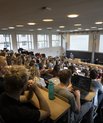Master’s degree reform and sector resizing
In June 2023, the Danish government and four opposition parties in the Danish Parliament agreed on a reform of the Danish university sector – known as the Master’s degree reform. In addition to changes to Master’s degree programmes, the reform includes sector resizing through the capping of admissions to some Bachelor’s degree programmes. On this webpage, you can find more information about how AU is working to implement the reform.
Members of academic staff at the faculties and departments are working to develop new, targeted degree programmes. The Committee on Education is working to establish a common AU framework for the cross-organisational aspects of the reform. The committee has divided its work into six tracks (see below):
AU is working in six tracks
The Committee on Education is responsible for coordinating the cross-organisational development initiatives in the following six tracks:
- 75 ECTS degree programmes (including transition to PhD). Coordinator: Vice-dean Kristine Kilså
- Framework for 75 ECTS Master’s degree programmes at AU (approved by the senior management team) (in Danish only)
- Work-integrated Master’s degree programmes and collaboration with business and industry. Coordinator: Vice-dean Finn Borchsenius
- 45 ECTS programmes (continuing education programmes). Coordinator: Vice-Dean Lise Wogensen
- Upper secondary education and Bachelor’s degree programmes. Coordinator: Vice-dean Niels Overgaard Lehmann
- Quality standards and international students. Coordinator: Vice-dean Morten Rask
- Admissions, early graduation, and degree programme information. Coordinator: Deputy director Anna Bak Maigaard
Relevant documents
- Supplement to the Master’s degree reform agreement: More flexible work-integrated Master’s degree programmes (December 2024) (in Danish only)
- Final report from the Master’s degree committee: The Master’s degree landscape of the future (Fremtidens kandidatlandskab) (November 2024) (in Danish only)
- Joint statement from university rectors on the final report (November 2024) (in Danish only)
- Implementation of sector resizing at AU (August 2024)
- Interim report from the Master’s degree committee: Towards a new Master’s degree landscape (På vej mod et nyt kandidatlandskab) (June 2024) (in Danish only)
- Master’s degree reform agreement (June 2023) (in Danish only)
Key terms explained
- Sector resizing: As part of the reform, admissions to Bachelor’s degree programmes will be cut by 8%. This will be phased in from 2025.
- One-year Master’s degree programmes: Some Master’s degree programmes will be converted from 2 academic years (120 ECTS) to 1.25 academic years (75 ECTS).
- Work-integrated Master’s programmes: Some Master’s degree programmes will be redesigned to combine full-time studies with project placements. Different combinations will be possible, e.g. the 1+2 model. On this model, students study full time for a year and then divide the following two years between their studies and work.
News on the reform and sector resizing
Latest news from the faculties
- Arts
- Natural Sciences
- Technical Sciences
- Aarhus BSS
- Health
![[Translate to English:] Illustrative image of a christmas ornament](https://medarbejdere.au.dk/fileadmin/_processed_/2/c/csm_julehilsen24_08e1ae6425.jpg)

